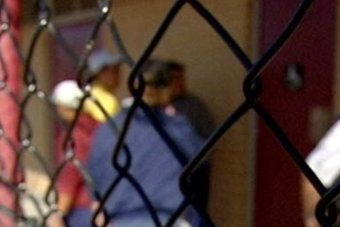High-profile drug and alcohol researchers are accusing the Queensland Government of failing to provide adequate healthcare to prisoners.
Queensland is the only state in Australia that does not offer methadone treatment to heroin addicts in male prisons, despite evidence it works.
The chief of prevention treatment and drug rehabilitation at the United Nations, Dr Igor Koutsenok, told the ABC that opiate replacement therapy is proven to reduce drug use and the chances of death.
“If you have a client who just entered the prison and this person was on methadone for a period of time prior to incarceration, I would never stop methadone abruptly at all, and the methadone maintenance should continue and the opiate replacement therapy should continue,” Dr Koutsenok said.
Research from the Australian Institute of Health Welfare shows over 70 per cent of prisoners have used drugs prior to being locked up.
Despite the logistical difficulties, many still continue to use behind bars, often sharing syringes and putting themselves at risk of blood-borne viruses.
Griffith University’s Professor Stuart Kinner said offering drug replacement therapies like methadone to prisoners is a no-brainer.
“Globally there’s an enormous and very compelling body of evidence that providing OST [Opioid Substitution Treatment] for people in prisons is effective in addressing their addiction. It reduces and often eliminates their use of illicit drugs and it reduces risky injecting behaviour,” Professor Kinner said.
Australia has endorsed a set of principals set down by the UN on the treatment of prisoners, known as the Mandela rules.
Professor Kinner said one of the key principles was that prisoners are not discriminated against in their access to healthcare just because they are behind bars.
“We have an obligation to provide them with healthcare which is an equivalent to what they would see in the community, it’s just unfortunately Queensland is the only jurisdiction that isn’t meeting that principle of equivalence with respect to OST in prison,” he said.
Opiate replacement therapy is provided in some form in prisons in all other Australian jurisdictions.
Despite that, Queensland is the only state not to offer the treatment in male prisons.
Prisoners should be helped to integrate in society
Figures from Queensland’s corrections department show the number of prisoners testing positive to drugs has doubled in the last year.
Because of its secretive nature, the exact rate of drug use behind bars is hard to measure, but Professor Kinner and his colleagues have found the rate of injecting in Queensland is high.
“We asked people about whether they injected drugs in prison during their current sentence and one-in-eight people we spoke to reported they had,” he said.
“So that’s a lot, that is a significant number.”
Dr Koutsenok argued prisoners with a long and severe history of heroin use should also be helped to transition back into the community.
“This would be probably a perfect candidate to start methadone maintenance three to four months prior to release and ensure this will be available after release, because this way we can prevent the overdose death,” he said.
Prisoners are more likely to die immediately after release from a drug overdose due to reduced tolerance.
“People who are opiate dependent while in prison typically, even if they use opiates less than they typically did before, and they start using again literally a couple of hours after release, and unfortunately many of them die because of the overdose because their tolerance will go down, so this is a big problem,” Dr Koutsenok said.
More treatment could save lives
Professor Kinner said the evidence showed providing more treatment in Queensland prisons would save lives.
“[It] reduces their risk of death immediately after release from prison, and we know there’s a particular spike in drug-related deaths just after release from prison,” he said.
We are at a point now where we don’t need more science, we don’t need more research we just need more action.
Professor Stuart Kinner, Griffith University
Dr Koutsenok, who is in Australia for the annual drug and alcohol research Winter School Conference, said the treatment was scientifically proven.
“Methadone is a medication, heroin is not, and because of that I’m trying to avoid the word substitution because this is what drives policymakers crazy,” he said.
“I prefer to use opiate replacement therapy which is a little bit more scientific and less stigmatising.”
The Queensland Government said it was looking at the issue and was considering a proposal to introduce opiate substitution therapy in prisons.
Professor Kinner said the time to act is now.
“We are at a point now where we don’t need more science, we don’t need more research we just need more action.”

